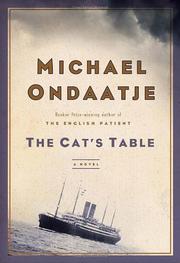


THE CAT'S TABLE
by Michael Ondaatje
A graceful, closely observed novel that blends coming-of-age tropes with a Conradian sea voyage.
The time is six decades past, and for reasons that have yet to emerge, a young boy is being packed off to England from his home in what was then called Ceylon. He climbs aboard a ship, the Oronsay, “the first and only ship of his life,” and falls in with two other boys about his age. All are banished to the opposite of the honor of the Captain’s Table—to the Cat’s Table, that is, along with “several interesting adults,” including a tailor, a botanist, a down-at-the-heels pianist and a ship’s dismantler. The boys have the good fortune of being “invisible to officials such as the Purser and Head Steward, and the Captain,” and are therefore able to make a Peter Pan adventure of the long passage across the Indian Ocean, Red Sea, Mediterranean and North Atlantic; as our narrator tells us, “The friendship between the quiet Ramadhin and the exuberant Cassius and myself grew fast, although we kept a great deal from each other.” Well, this being a novel by the eminently accomplished Ondaatje (Divisadero, 2007, etc.), you may be certain that the tale will involve some tragedy, some heartache and some miscommunication—and, yes, death. It is also beautifully detailed, without a false note: It is easy to imagine, in Ondaatje’s hands, being a passenger in the golden age of transoceanic voyaging, amid a sea of cocktail glasses and overflowing ashtrays, if in this case a setting more worthy of John le Carré than Noel Coward. Ondaatje writes with considerable tenderness of children who are all but abandoned, and at his best he lands squarely in Conrad territory, a place that smells of frankincense and in which “clotted clouds speckled the sky” and sandstorms blow out to sea from distant deserts—just the sort of place, in other words, that a reader wants to inhabit.
Elegiac, mature and nostalgic—a fine evocation of childhood, and of days irretrievably past.